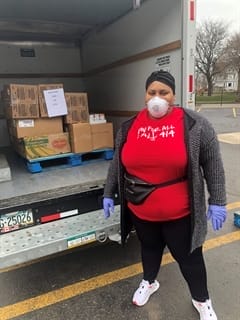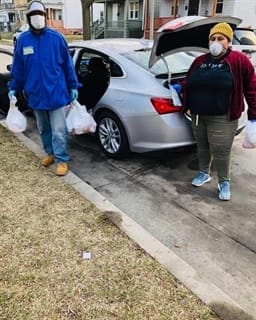Wisconsinites rush to help neighbors in need during crisis, prove fundamental goodness of civil society
Judith Valentino is a clinical lab tech by trade, a crafter by passion. She’s converted part of the basement in her Hales Corners home into a 700-square-foot room where she works on craft projects, mostly quilts. She donates many of her works to patients at Children’s Hospital of Wisconsin in Milwaukee.
After the coronavirus hit Wisconsin, Valentino became part of a small army of volunteers doing what they can to help.
“Children’s Hospital came up with a pattern for high-quality masks that they needed,” Valentino says. “If Children’s puts out a statement that they need something, man, they need it, and I’m happy to do what I can.”
Sydney Sanger, owner of Hyde Park Tailors in Wauwatosa, is also among the many volunteers making and donating masks, which are in short supply.
“Sydney knows a lot of people who work in health care,” says her husband, Peter. “She found a couple patterns, made a few and gave them to her friends to evaluate. They determined what worked best. Now she’s made 300.”
Throughout the country, individuals and businesses are responding to the better angels of their nature by helping neighbors and strangers alike in the battle against COVID-19.
“COVID-19 is creating economic havoc, and the long-term negative impact is hard to predict,” says Michael M. Miller, a research fellow at the Acton Institute for the Study of Religion and Liberty. “There is a possible, positive outcome, however. If businesses, voluntary organizations, churches, and families find creative ways to help others and find new ways to integrate and solve problems, it is possible that the citizens of the United States could come out of this crisis with a deep confidence in our ability to self-govern.”
“It would show Americans and the world that, despite serious problems, America’s civil fabric is actually thicker and richer than we thought,” he adds. “And this could have a profoundly positive impact on the economy.”
In Wisconsin, thousands have come forward to help their neighbors — from Wausau to Madison, La Crosse to Green Bay and virtually every community between. Volunteer Wisconsin, a project begun by the United Way of Wisconsin, can match virtually anyone who wants to help with a neighbor in need.
Volunteerism has surged since the outbreak, says Charlene Mouille, United Way of Wisconsin’s executive director. In addition to making masks, many are providing online tutoring for homebound students or distributing food to the needy. But there are other creative ways people are helping out.
“Marathon County started an effort to thank health care workers,” Mouille says. “Another new program is one that provides hope — it’s aimed at helping people get ready to plant spring gardens by starting seedlings.”
A simple thing that anyone can do is check on neighbors, especially those who live alone or in nursing homes, Mouille notes. “We’re all feeling the stress of isolation,” she says. “A simple note or call can help.”
Milwaukee’s central city is particularly hard hit, with about half of Milwaukee County’s COVID-19 death toll coming from the largely African American communities on the north side. One of those neighborhoods is Metcalfe Park.
Metcalfe Park Community Bridges, a not-for-profit formed many years ago, has adapted to meet the special challenges that the pandemic has brought.
Melody McCurtis, a leader in the group, texted a survey to 7,500 residents to ascertain their needs. The top response was for information on the virus and what to do to protect themselves. She gathered the information and texted it to residents and posted it online. Cleaning supplies, food and help in teaching their children came next in the survey responses.
There’s just one grocery store in the neighborhood and the only gas station, which had a small store, closed during the early weeks of the contagion, says Danell Cross, the group’s executive director.
“Some people have two or three kids, each attending a different school,” she says. “How are you going to get to the school for the food they offer? How are you going to get to the store at all? Do you take your kids or leave them home? If you can’t get gas, it’s a long walk or a bus ride.”
Community Bridges, like many community organizations, relies largely on donations from other nonprofits. The McGinnity Family Foundation and the Jewish Community Center have been especially generous, Cross says. “We couldn’t get the food donations we desperately needed, but the JCC got it for us,” she says.
Neighborhood mothers want to educate their children, but most don’t have computers at home. Recently, Community Bridges got the curriculum for each grade level and delivered them to homes.
Angela Harris, a Milwaukee Public Schools teacher, felt she had to do something to help. She turned to the Milwaukee Inner-city Congregations Allied for Hope with a plan to create Milwaukee Community Care and Mutual Aid.
Harris established depots, one each on the north and south sides of Milwaukee, to get people what they need to weather the crisis. “Mostly we distribute non-food items like diapers, cleaning supplies, Tylenol and toiletries,” she says. “But we try to meet whatever needs they have.”
While government funds can help, “typically you have to jump through hoops and overcome barriers to get what you need, and we don’t have time for that,” Harris says. “We are a community, and if my neighbor is in need, then I’m in need. We all have to do what we can,” she adds.
Some of those neighbors in need are the homeless.
The Archdiocese of Milwaukee’s Saint Francis de Sales Seminary reached an agreement in late March to convert Clare Hall, a building that once housed seminarians, to provide shelter for up to 80 homeless. “This is simply the right thing to do,” says Archbishop Jerome Listecki.
Cindy Krahenbuhl is executive director of the Guest House with two shelters for the homeless, many with mental health issues. In the past, her organization relied on volunteers to prepare meals but now have a contract with the Milwaukee Center for Independence food service.
“We have people with symptoms but not bad enough for hospitalization,” she says. “We isolate them. The staff is doing a phenomenal job on disinfection. They are on the front lines, just like the hospitals.”
The Gathering, another meal program that is an interfaith ministry begun by the Episcopal Diocese, prepared meals at four sites until recently, says Natalie Kashou. “We can’t do that anymore,” she says. “We have prepared bag lunches. We have to have open doors. With so many businesses closed, many of our guests have no place to go to even to use a restroom.”
The crisis has prompted some organizations to go outside their normal mission.
The Milwaukee Chinese Community Center is a nonprofit that since 2006 has been educating the Milwaukee community about the Chinese culture. It shares that culture via New Year’s celebrations and dragon boat races. But that was before COVID-19.
Over the past few weeks, the group has provided 1,300 masks to police and fire departments and raised $35,000 for the United Way, says Wei Gao, the group’s general secretary.
“I see America as my home,” Gao says. “We saw that our neighbors were in need, and so we organized to help.”
Miller notes that while government has a clear role in times like this, it also has the important responsibility of allowing civil associations, private individuals and private companies to offer solutions to the crisis.
“We, too, have a role,’ he adds, “to participate in our associations, to build new ones, to come up with creative solutions to the lockdowns that strengthen community and fight individualism, and to confirm our souls in self-control, so the government doesn’t have to do it for us.”
Marie Rohde is a freelance journalist who for many years wrote for The Milwaukee Journal and the Milwaukee Journal Sentinel. Permission to reprint is granted as long as the author and the Badger Institute are properly acknowledged.







